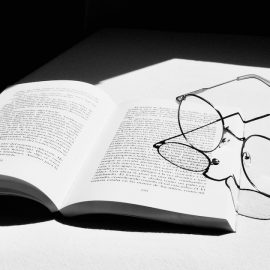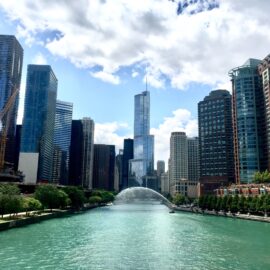

This article is an excerpt from the Shortform book guide to "Flow" by Mihaly Csikszentmihalyi. Shortform has the world's best summaries and analyses of books you should be reading.
Like this article? Sign up for a free trial here .
What is Flow: The Psychology of Optimal Experience about? How can Csikszentmihalyi’s advice help you find flow in your own life?
Flow: The Psychology of Optimal Experience is a 1990 book about reaching the “flow state” written by psychologist Mihaly Csikszentmihalyi. In the book, you will learn what flow is, how to control your consciousness, activities you can do that promote flow, and how achieving flow on a regular basis can improve your quality of life.
Keep reading for an overview of Flow: The Psychology of Optimal Experience by Mihaly Csikszentmihalyi.
The Psychology of Optimal Experience
Though we live longer and have more material wealth than ever, many people feel anxious rather than happy. In Flow: The Psychology of Optimal Experience, psychologist Mihaly Csikszentmihalyi offers an antidote: “Flow.” In this summary, we’ll explore what flow is, how it influences our happiness, and how to cultivate it.
Flow: A Clue Toward Happiness
People are happy when they feel a sense of control over their thoughts and feelings. When this happens, we experience a “flow” state: We enjoy ourselves, we feel a sense of purpose and meaning, and other things don’t seem to matter as much. Csikszentmihalyi also refers to these states as “optimal experiences,” glimpses into a life we wish we could live all the time. For example, an artist immersed in creating a beautiful painting is experiencing flow (an “optimal experience”). It can also happen when you gain an important insight during tough times.
Optimal experiences occur most frequently when you’re voluntarily working hard to achieve something important. For example, a swimmer competing in the most difficult race of her career may experience muscle cramps and fatigue, but she may look back on the experience as worthwhile because she directed her actions and accomplished something admirable.
How Consciousness Works
To better facilitate flow experiences, you need to understand what your consciousness is and how it operates.
Intention and Attention: Basic Ordering of Consciousness
Consciousness is a mental state of awareness in which we perceive, process, order, and act on sensory input and information—feelings, ideas, and perceptions. You evaluate every piece of information you encounter to determine whether it supports or threatens your goals.
When you get feedback that doesn’t align with your goals, you experience fear and anxiety, making working on your goals difficult. Csikszentmihalyi calls this “disorder in consciousness” or “psychic entropy”: Your attention is divided, making it near-impossible to achieve a flow state.
In contrast, when you get feedback that affirms your goals, such as seeing you’re on track to completing a marathon, you’re in a state of flow. Csikszentmihalyi calls these kinds of experiences flow experiences because people describe feeling like they’re floating and that their energy is flowing in the direction they want.
To reach a flow state and accomplish your goals, you need to direct your attention. When your attention is so focused that everything else fades into the background, you achieve what Csikszentmihalyi calls “inner order” or “order in consciousness.”
Because all of your thoughts, feelings, and memories are shaped by how you direct your attention, attention is the most important tool you have to order your consciousness and improve your quality of life.
The Benefits of Flow
Doing activities that produce flow as frequently as possible has three main benefits:
- You become more self-confident because you feel skilled and capable, and you’re investing energy toward goals you’ve deemed worthwhile.
- You improve your experience of life. Even boring tasks are rewarding when made to align with your goals.
- You become a more complex individual. Complexity has two parts. First, you feel a sense of differentiation because you’ve done something that makes you feel capable and unique. Second, you feel a sense of integration: Your consciousness is well-ordered and you feel in balance with the different parts of who you are.
Characteristics of the Flow Experience
This section describes the characteristics of enjoyable flow experiences. First, you’ll learn what distinguishes a merely pleasurable experience from an enjoyable one that creates flow.
Pleasure vs. Enjoyment
You experience pleasure when you meet biological needs or needs you’ve developed through social conditioning. But pleasure alone can’t provide happiness. For example, eating restores the body’s sense of balance (a pleasurable experience), but it’s often passive and doesn’t help you grow as a person or make you more complex. Pleasure helps order your consciousness, but it can’t create new order. In other words, pleasure doesn’t foster personal growth.
In contrast, enjoyment can create new order in consciousness because it requires effort. Enjoyable experiences occur when you satisfy a need or desire, and you:
- Achieve something unexpected or unimagined
- Feel a sense of accomplishment and newness
- Feel like you’ve changed and grown more complex as a person
To reorder your consciousness and feel happier, you need to seek new, challenging goals and work toward them frequently.
The Nine Elements of Enjoyment
When people describe an enjoyable experience conducive to flow, they mention one or more of the following nine components:
- You’re able to concentrate on an activity for an extended period of time.
- The task has a clear goal.
- You receive immediate feedback on your progress.
- You have the skills to complete the task.
- You feel a sense of control.
- You’re absorbed in the task, and it feels almost effortless. You’re not thinking about stresses from the rest of your life.
- Your sense of time is altered. You either feel like time passes quickly or that it has slowed in a helpful way.
- You don’t feel self-conscious, and your sense of self emerges stronger.
- The experience is autotelic: You want to repeat it because it was so enjoyable.
Activities and Personality Traits That Promote Flow
Flow-producing experiences unfold in stages. This section explores the stages of flow and the personality characteristics that promote flow.
The Stages of Flow-Producing Activities
Your consciousness becomes more complex in several stages. When engaging with an activity, you enter and exit a flow state depending on whether you’ve reached your current goal. The stages are:
- Flow 1. You start an activity and immediately have to master certain skills to do it well. For example, if you’re learning to play tennis, just learning how to hit the ball over the net will occupy your time at first.
- Boredom or Anxiety. Once you’ve achieved your goal, previous challenges, such as clearing the net, are now easy, causing you to be bored and exit flow. Or you may face an opponent with more advanced skills, causing you to be anxious and exit flow.
- Flow 2. This stage occurs when you leave your anxious or bored state by working toward new goals. In the tennis example, you might start practicing a new skill, such as hitting the ball toward the outer edge of your opponent’s court. Once you’ve achieved these goals, you may slip back into Boredom or Anxiety, at which point you’ll have to develop new goals.
Personality and Flow
Your ability to experience flow may depend on the experiences you had growing up and the habits you’ve acquired. If you’re naturally inclined toward finding flow in everyday experiences, you have an autotelic personality. People with autotelic personalities habitually do four things:
- Observe the environment and identify opportunities in which to act.
- Set goals. Once they’ve set the goal, they monitor feedback as they develop new skills and adjust their behavior accordingly.
- Concentrate on activities. People with autotelic personalities focus their attention and immerse themselves in all they do.
- Enjoy a variety of experiences. People with autotelic personalities enjoy a variety of activities, even when life is harsh. This includes diligently seeking enjoyment—having a relaxed attitude and thinking things will just work out isn’t enough.
Find Flow Through Ordered Activities
To transform an activity into a flow activity, create a framework for what you want to do and how you’ll measure progress. Here’s how:
- Set a goal. Write your main goal and any related, smaller goals you’ll need to achieve first.
- Decide how you’ll measure your progress. This could be any unit of measure. For example, if your goal is to decrease the time it takes you to run a mile, your unit is time.
- Concentrate on the activity. Flow comes with focus. Choosing an activity that is challenging enough helps you concentrate on it.
- Study all aspects of the activity to understand its nuances. For example, if your goal is to improve your golf game, you might study different putting techniques.
- Develop the skills needed to take advantage of new opportunities. When you first set a goal, you may not be aware of all the opportunities available to you. As you learn of them, develop the skills you need to take advantage of them.
- Don’t get bored. Once you’ve mastered your goal, create a new goal to challenge yourself and avoid boredom.
Find Flow Through the Mind
Just as physical activities and those involving the senses can produce flow, so can activities that require deep thinking.
Writing
Writing provides a way to understand your experience and remember it in the future, giving order to your consciousness. Here are three kinds of writing to try:
- Poetry. Writing poetry helps present experiences in a new light while using conventions creatively. Reading poetry is a good way to learn how to write it.
- Prose. Writing basic prose allows you to voice your experience and is more accessible because it lacks conventions like rhyming and meter. Writing letters or journaling work well for this purpose.
- Crossword puzzles. Each clue in a crossword is a mini-riddle, and solving each mini-riddle gives you a sense of accomplishment.
History
Studying history—your own or someone else’s—has the following benefits:
- You escape from the present and mentally explore another time.
- You create a record of a time that you can draw on for future reference.
This includes going to museums, reading books, or writing an account of your family history.
Find Flow at Work
This section explores what makes work feel worthwhile.
Study: Our Paradoxical Relationship With Work and Leisure
To examine people’s relationship with work and leisure, Csikszentmihalyi paged study participants eight times a day for two weeks and asked them to report what they were doing and feeling, how many challenges they were dealing with, and how many skills they were using. A person was said to experience flow when they were dealing with an above-average number of challenges for the week, and they were using an above-average number of skills. Here were the main results:
- During work, people reported being in flow 54 percent of the time.
- During leisure—including activities such as eating out, socializing with friends, and watching TV—people reported being in flow just 18 percent of the time.
The more regularly a person was in flow, the more likely they were to report a high quality of experience. When in flow, they described feeling “active,” “creative,” “concentrated,” “motivated,” and “strong.” In contrast, people experiencing apathy—facing a below-average number of challenges and using a below-average number of skills—described feeling “dull,” “dissatisfied,” “passive,” and “weak.” People were apathetic:
- 16 percent of the time at work.
- 52 percent of the time during leisure.
To Find Flow, Adapt or Find New Work
There are two ways to find flow through work:
- Adapt to opportunities. Recognize the opportunities for flow and take advantage.
- Pursue work that’s likely to produce flow experiences. It’s possible your current job offers few opportunities for flow. Find another line of work that is more conducive to producing flow.
Find Flow in Your Relationships
In addition to enjoying your work, the second biggest influence on your happiness is your relationships. Transforming your relationships into flow experiences makes them more enjoyable and fulfilling.
In contrast to relationships with family members, it’s easier to enjoy friendships because you’re able to choose friends who have similar goals and interests—your friends affirm your current goals. People report their most positive moods with friends and tend to associate friendships with adventure and excitement.
Friendship can be a flow-producing experience because it’s one of the only relationships in which you can fully express yourself. With your family, you may have to fit a certain role, such as being respectful to your parents, or if you’re a parent, providing care to your children. At work, your behavior may be expected to reflect your role. In contrast, with friends, you can show your true self because your goals are similar. Like other flow experiences, for friendship to be enjoyable, you have to find new challenges to work on together.
Navigating Challenges and Trauma
Each time you face a difficult situation, it creates disorder in your life, and it may affect your ability to concentrate on your goals and achieve flow. Three factors affect your ability to deal with challenges: psychological resources (such as an extrovert’s ability to make friends), outside support, and transformational coping.
Transformational Coping
Transformational coping has three components:
- Unconscious self-assurance. No matter what happens, you feel in control of your destiny and able to adapt to whatever environment or situation you encounter. For example, pilots are trained to navigate in any weather conditions, which gives them the confidence to address any challenge.
- Focusing on the world instead of yourself. If you’re narcissistic, and your environment becomes adverse, you shift inward to protect yourself and don’t have the energy to keep engaging with the outside world. Instead, pay more attention to the world around you to feel part of your environment and overcome challenges. For example, if you’re headed to work for a meeting, but you discover that your car won’t start, you may be overwhelmed by frustration instead of seeking an alternative, such as taking a taxi to work, or working from home. Continuously paying attention to what’s happening in your environment can help you avoid becoming immobilized by frustration or fear.
- Creating solutions. When you face obstacles to your goals, you have three possible courses of action: Remove the obstacle, alter your goals, or create new goals. For example, if you are hoping to get a promotion at your company and realize that a coworker might be selected instead, you can either work to convince the person making the decision that you’re the best candidate (removing the obstacle) or create a new goal, such as pursuing more challenging work in a different department. Choose a solution that makes your life more enjoyable and is in harmony with your overall goals.
Find Meaning in Life
Finding flow in one or more activities doesn’t mean that your life will feel unified and purposeful. To live a balanced, meaningful life, cultivate a sense of purpose to guide the goals and activities you pursue and relate them to each other, making your life into one large flow experience. There are three stages of finding meaning:
- Find an overarching purpose or goal for your life.
- Dedicate yourself to the goal.
- Achieve harmony.
1. Find an Overarching Purpose or Goal
Finding meaning that gives order to your consciousness and life is the meaning of life. This involves alternating between focusing on yourself and focusing on the world around you, differentiating yourself from others in your community, and becoming more integrated into your community. Here are the four stages of developing your life’s purpose:
- Keeping yourself alive. This means satisfying your basic needs, including finding pleasure and comfort.
- Finding meaning in community. Once your basic needs are met, you seek communities to find meaning and purpose—for example, your family, religious groups, or your neighborhood. During this phase, you may conform to the norms in the community in order to fit in, but you still become more complex in the process.
- Regaining autonomy. In this phase, you continue to participate in your communities, but you’re no longer simply conforming to them: You return your attention to yourself and recognize the value your individuality brings to your group. This leads to the desire to continue growing and improving yourself.
- Reintegration with the community. After working on self-improvement, you’re ready to integrate your interests with those of your communities.
2. Dedicate Yourself to the Goal
Once you know what your purpose is, find the time and energy to dedicate yourself to a goal that’ll help you fulfill your purpose. Here are two challenges that may surface during this stage and how to deal with them:
- You have too many goals competing for your attention. Even if you identify your life’s purpose, it can be difficult to decide what goal to pursue because there are often many goals you can pursue to fulfill your purpose. When you face too many choices, you drain your energy deciding which one to pursue. Having a clear goal with clear rules to follow makes it easier to commit to working on it. Before deciding to commit to a goal, ask if it’s clear enough and whether you’ll truly enjoy doing it.
- You know what you want to do, but lack the energy to do it. If you know what you’d like to do, but you can’t find the energy to do it, you’ll waste time feeling upset. Working on the goal can help you gain valuable skills and experience, and may help you decide what to do next, even if you can’t ultimately achieve the goal.
3. Achieve Inner Harmony
Finding your purpose and dedicating yourself to specific goals helps you achieve inner harmony in two ways:
- You have more opportunities to act than you’re capable of taking on, yet you feel equipped to act on an above-average number of opportunities. Though you can’t accomplish everything, what you accomplish is significant because it exceeds expectations. However, you have to deal with an appropriate level of challenge—if you face too few challenges, you’ll be bored, but if you face too many challenges, you’ll feel anxious.
- You lessen psychic entropy, or a feeling of being stuck. Pursuing your goals focuses your attention on achieving those goals and away from underlying worries, such as loneliness.

———End of Preview———
Like what you just read? Read the rest of the world's best book summary and analysis of Mihaly Csikszentmihalyi's "Flow" at Shortform .
Here's what you'll find in our full Flow summary :
- Why people feel the happiest when they're in the "flow state"
- What activities and personality traits promote flow
- Why you may have a paradoxical relationship with work and leisure






